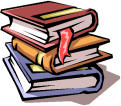 |
 |
 |
 |
 |
|
Pathfinder Menu
|
Arizona Health Sciences Library
|
List of Resources
|
Bibliographic Scope
|
Types of Resources
|
Categories of Resources
|
|
||||||||||||||
Bibliographic Scope of the Pathfinder |
||||||||||||||
| To locate books by types of reference material please click here. | ||||||||||||||
| To locate books by categories of reference material please click here. | ||||||||||||||
| To locate books by subject headings of reference material please click here. | ||||||||||||||
| This pathfinder identifies the resources available at the AHSL to high school teachers affiliated with any of the Primary Investigators or Community Outreach and Education Program (COEP) staff associated with the Southwest Environmental Health Sciences Center (SWEHSC) of the College of Pharmacy. About 100 teachers fall into this category. Some of these teachers are in Tucson and the rest are in other parts of southern Arizona. In order to best utilize the materials available, these teachers may need to investigate subject matter in depth. Some of the material in this library will be too technical for this group of users. They need general information to support the curriculum disseminated by SWEHSC, through their web site and workshops. | ||||||||||||||
| This pathfinder identifies the resources available at the AHSL to high school teachers affiliated with any of the Primary Investigators or Community Outreach and Education Program (COEP) staff associated with the Southwest Environmental Health Sciences Center (SWEHSC) of the College of Pharmacy. About 100 teachers fall into this category. Some of these teachers are in Tucson and the rest are in other parts of southern Arizona. Some of the material in this library will be too technical for this group of users. They need general information to support the curriculum disseminated by SWEHSC, through their web site and workshops. To meet this need the pathfinder focuses on ready-reference, handbook, and online resources. | ||||||||||||||
| The nature of the AHSL dictates the scientific and technical aspect of this pathfinder. I chose the materials based on the range of classes taught by the teachers. Some teach advanced placement science courses, others teach special education students in general science classes. Some are not science teachers, but support the learning of science from language arts or social studies. All need to have a basic understanding of environmental health and toxicology to support student learning and need deeper knowledge to answer student questions. Distance access is especially important for current information. Teaching the history of science requires retrospective information, such as that found in the Encyclopedia of Toxicology. One book, A Practical Approach to Occupational and Environmental Medicine, has an accompanying CD Rom. Five videos seem useful. However, two are only available for 24-hour periods, which may be a problem for teachers. | ||||||||||||||
| Numerous searches, over several semesters, for information about teacher information seeking behavior have been disappointing. Most of the research seems to concern student information seeking skills. However, the Ambikapathi (1999) article is insightful and supports my experience working with public school teachers. | ||||||||||||||
| “The products of the information seeking activity are based on interacting forces such as accessibility, familiarity and awareness of information sources; skills associated with information seeking process; and governed by the preference toward national language. There was a general lack of interest in reading books and newspapers. Lack of time was one of the major limiting factors in the information seeking process. Library and media specialists in colleges should re-examine their collection to meet the requirements of their trainees and the teacher training curriculum. Having a large collection of resources would not necessarily solve this problem. The resources should be systematically catalogued and regularly shelved to facilitate accessibility. Besides, adequate subject headings should be provided in the electronic catalogue. The trainees' incompetence in using major computer software programs was largely due to unfamiliarity. Teachers who lack the skills to identify and locate information may not know how to locate and obtain good quality resources for teaching, and then the quality of instruction for students would be adversely affected.” (Ambikapathi, 1999, p.23) | ||||||||||||||
| Ambikapathi (1999) stresses the need to instruct teachers concerning information location with the Internet and digital resources. Each year at least one session of the SWEHSC – COEP Teacher Workshop is dedicated to teaching theses skills and we take the participants on a tour of the library. Because of the receptiveness of the teachers to this training, I included all the online resources the AHSL recommends and pointed the pathfinder to both print and electronic journals. | ||||||||||||||
| Pathfinder Assignment for IRLS 524 Marti Lindsey mlindsey@u.arizona.edu Last updated: August 14, 2003 | ||||||||||||||